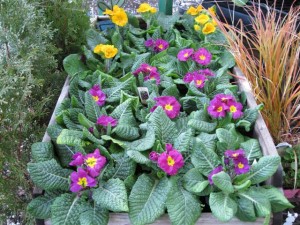February Newsletter
As I write this January is coming to an end and I know Spring will be here before I know it. Most of our big dry goods orders for spring have been placed and our 2013 selection of things is starting to be delivered. As many of you are aware it begins with bare root trees. We received our 2nd big order today of shade trees and fruit from Cooke so most of our selection has arrived. We have not received everything on order from Dave Wilson yet but most came last week. Please check out the website for a full list. You can find us at davewilson.com and I hope to have the list posted on our website as well. I am attaching the list from Cooke in this newsletter along with the new roses we expect to have by mid-February. The window for bare root roses will be small as we have to get rolling on getting things potted too.
 The nursery is still in winter mode and there just is not that much available from our local wholesalers in color. Many of you are aware that I do not order from Southern CA and get almost everything from a 200 mile radius. I feel these plants are better acclimated to us. Please be patient. We have lots of fresh primrose in but the pansy selection is limited. We still have a few spring bulbs left at 75% off the marked price but summer bulbs will be here in a couple of weeks.
The nursery is still in winter mode and there just is not that much available from our local wholesalers in color. Many of you are aware that I do not order from Southern CA and get almost everything from a 200 mile radius. I feel these plants are better acclimated to us. Please be patient. We have lots of fresh primrose in but the pansy selection is limited. We still have a few spring bulbs left at 75% off the marked price but summer bulbs will be here in a couple of weeks.
For the edible garden we just received our 2013 seeds, have several varieties of organic seed potatoes in stock and bare root asparagus, artichokes, rhubarb and horseradish. I also have sunchokes but I might have to get them into pots quickly as I have had them mold on me if I do not. Our bare root strawberries are here too.
Is it too late to spray my roses? Fruit trees? No it is not. Winter and spring give us the most problems with disease. Brown spot on Photinia, Peach Leaf Curl on peaches, Black Spot on roses to name a few. To help you combat these problems we will offer our subscribers a 20% off coupon with this newsletter. This will include Bonide’s copper spray (the best choice for peaches) , the amazing Bacillus culture Seranade (we used this last year on the roses and were very pleased) and our newest addition to our organic controls that we have heard good reviews on, Actinovate. Actinovate is an OMRI approved microorganism called Streptomyces lydicus strain WYEC 108. You can use it to combat lawn disease, downy mildew, black spot, root rot, damping off and more in lawns, trees, shrubs, perennials, annuals, vegies and more.
Looking for even more savings? Join our VIP Club for more periodic special offers on your cell phone by texting 83654 and writing the message STAR.
February Specials
- Plant of the Month- 20% OFF
- Fall bulbs (for spring bloom) 75% OFF while they last
- Buy 5 fruit trees and get a 6th FREE
- Last years potted fruit trees are HALF-OFF regular price
- We are continuing our ongoing
- Fill a Flat where you buy 7 6 packs and get the 8th FREE. (The nursery flats normally hold 8 jumbo packs, hence the name)
- Baker’s Dozen- Buy 12 4”annuals or perennials and get a 13th FREE.
- Get the 10th bag FREE when you buy 9 of the same regularly priced bagged soils
Plant of the Month
Viburnum tinus ‘Spring Bouquet’
also called V. tinus ‘Compactum’
I love this evergreen, deer resistant Mediterranean native. It makes an excellent hedge, topiary or container plant, so it will take clipping. The leaves are deep green and leathery. The new stems are red colored making a nice contrast with the foliage. This shrub blooms in winter thru spring with tight clusters of pink buds that open to slightly fragrant white flowers. They produce a shiny metallic blue berry that lasts into fall.
You can plant these in full sun to light shade but powdery mildew can be a problem in shady spots. It can withstand some drought once established but will need summer water, specially in the sun. The foliage makes nice filler for flower bouquets. This is a valuable landscape shrub.
The plain V. tinus is not as common in the industry and grows up to 12′ and makes a good screen. I do get it in stock when possible.
Take 20% OFF the regular price of our one and five gallon V. tinus ‘Spring Bouquet’ in February.
Tanya